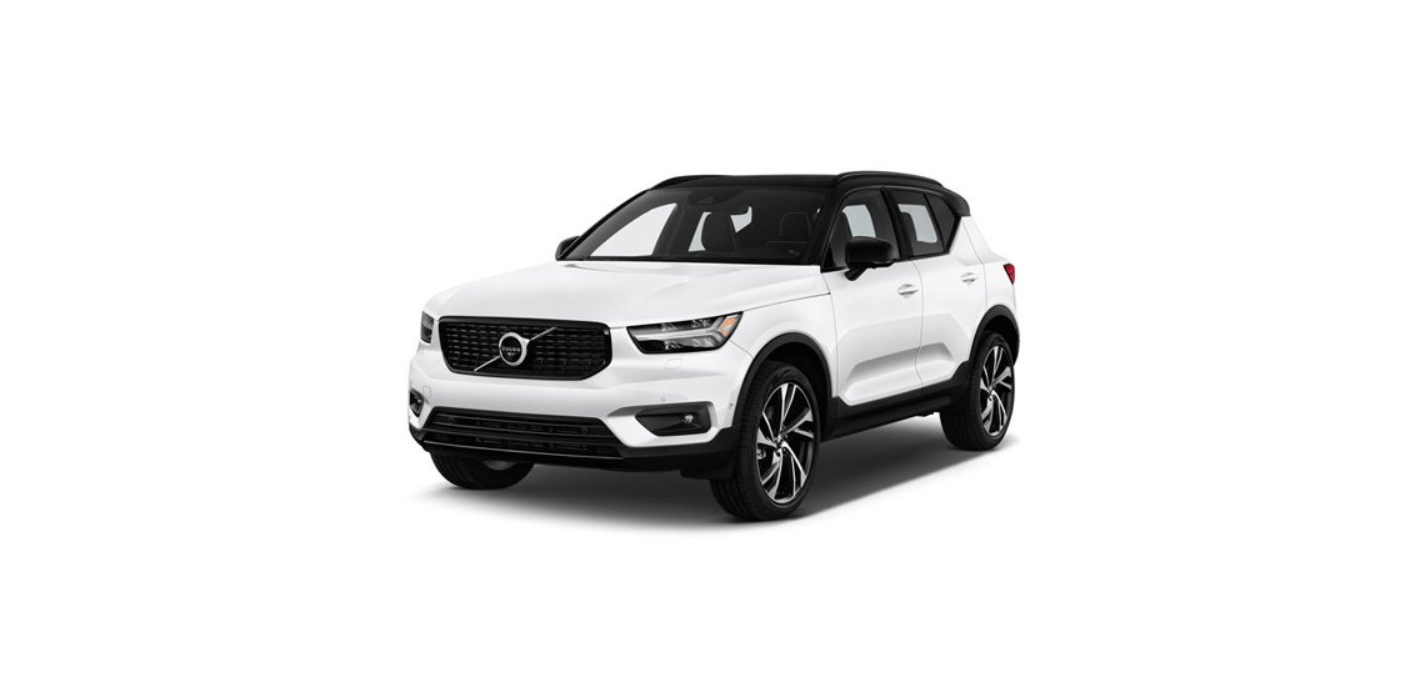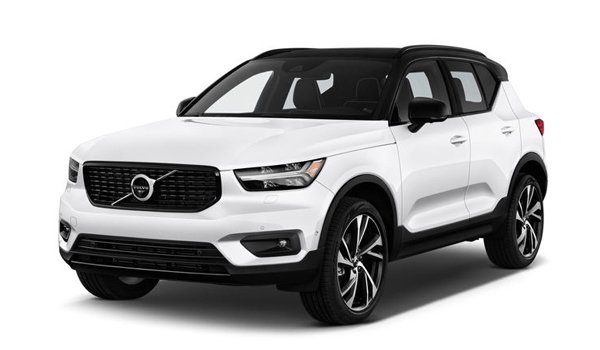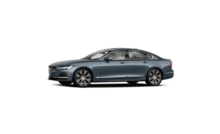Displays and controls by the driver in a left-hand drive car
The overviews show where the displays and controls near the driver are located.
Steering wheel and instrument panel
- Position lamps, daytime running lights, dipped beam, main beam, direction indicators, front fog lamps/cornering lights, rear fog lamp, resetting the trip meter
- Driver display
- Wipers and washing, rain sensor
- Right-hand steering wheel keypad
- Steering wheel adjustment
- Horn
- Left-hand steering wheel keypad
- Display lighting, unlocking/opening/closing of tailgate
Roof console
- Front reading lamps and interior lighting
- Panoramic roof
- Display in roof console, ON CALL button
- Manual dimming of interior rearview mirror
Centre and tunnel console
- Centre display
- Start button
- Hazard warning flashers, defrosting, media, drive mode button
- Electrical socket, USB port, wireless phone charger
- Gear selector
- Parking brake
- Automatic braking when stationary
Driver’s door
- Memory for settings for power front seat, door mirrors
- Central locking, power windows, door mirrors and child locks
- Bonnet opening
- Adjusting front seat
Displays and controls by the driver in a right-hand drive car
The overviews show where the displays and controls near the driver are located.
Steering wheel and instrument panel
- Position lamps, daytime running lights, dipped beam, main beam, direction indicators, front fog lamps/cornering lights, rear fog lamp, resetting the trip meter
- Wipers and washing, rain sensor
- Driver display
- Display lighting, unlocking/opening/closing of tailgate
- Right-hand steering wheel keypad
- Horn
- Steering wheel adjustment
- Left-hand steering wheel keypad
Roof console
- Front reading lamps and interior lighting
- Panoramic roof
- Display in roof console, ON CALL button
- Manual dimming of interior rearview mirror
Centre and tunnel console
- Centre display
- Start button
- Hazard warning flashers, defrosting, media, drive mode button
- Electrical socket, USB port, wireless phone charger
- Gear selector
- Parking brake
- Automatic braking when stationary
Driver’s door
- Memory for settings for power front seat, door mirrors
- Central locking, power windows, door mirrors, electric child lock
- Bonnet opening
- Adjusting front seat
Connection of equipment to the car’s diagnostic socket
Incorrect connection and installation of software or diagnostic tools may have a negative effect on the car’s electronic system.
Volvo strongly recommends that Volvo owners only install Volvo-approved original accessories and that installation of accessories is only carried out by trained and qualified Volvo service technicians. Certain accessories only function when associated software is installed in the car’s computer system.
Note
Volvo Cars accept no liability for the consequences if unauthorized equipment is connected to the On-board Diagnostic socket (OBDII). This socket should only be used by trained and qualified Volvo service technicians.
Change of market when importing or relocating
When you import a car or relocate a car to another country, it is important that you register the car in the new market in order, for example, for the online services to work correctly, as well as to ensure that the car complies with local requirements and laws.
Visit an authorized Volvo dealer
To get help registering the car, visit an authorized Volvo dealer.
If you do not do this then you may experience that apps, Volvo On Call, software downloads and other online services are affected and do not work correctly.
Creating a new Volvo ID in your new home market
When you relocate to another country you should create a Volvo ID in the new country.
If you have already created a Volvo ID in another country and want to use the same email address, you must first delete your Volvo ID in the region you originally created it. Alternatively, you can create a new Volvo ID using another e-mail address.
For cars with Volvo On Call
Download the Volvo Cars app from the country where the car will be used and link the app to your car.
Note
Visit an authorized Volvo dealer if you have imported or relocated with your car to a new country.
Available services may vary depending on the market and car model.
Note
If the car is exported to another market, Volvo is not responsible for any adaptations to the car in order to comply with requirements or laws that apply in the importing market. Read more in Service and Warranty or contact your Volvo workshop for more information.
Showing the car’s identification number
All cars have a unique identification number, VIN. This is required, among other things, for contacting a Volvo dealer if you have questions on Volvo On Call, for example.
- Tap on Settings in the center display’s top view.
- Continue to .
The car’s identification number is shown.
Another way of finding VIN is:
- on the first page of the Service and warranty booklet
- in the car’s registration document
- look on the dashboard through the car’s windscreen.
Recording data
As part of Volvo’s safety and quality assurance, certain information about the vehicle’s operation, functionality and incidents are recorded in the car.
Event Data Recorder (EDR)
This vehicle is equipped with an “Event Data Recorder” (EDR). Its primary purpose is to register and record data related to traffic accidents or collision-like situations, such as times when the airbag deploys or the vehicle strikes an obstacle in the road. The data is recorded in order to increase understanding of how vehicle systems work in these types of situations. The EDR is designed to record data related to vehicle dynamics and safety systems for a short time, usually 30 seconds or less.
The EDR in this vehicle is designed to record data related to the following in the event of traffic accidents or collision-like situations:
- how the various systems in the car worked
- whether the driver and passenger seatbelts were fastened/tensioned
- the driver’s use of the accelerator or brake pedal
- the travel speed of the vehicle.
This information can help us understand the circumstances in which traffic accidents, injuries and damage occur. The EDR only records data when a non-trivial collision situation occurs. The EDR does not record any data during normal driving conditions. Similarly, the system never registers who is driving the vehicle or the geographic location of the accident or near-miss situation. However, other parties, such as the police, could use the recorded data in combination with the type of personally identifiable information routinely collected after a traffic accident. Special equipment and access to either the vehicle or the EDR is required to be able to interpret the registered data.
In addition to the EDR, the car is equipped with a number of computers designed to continually check and monitor the function of the car. They can record data during normal driving conditions, but in particular register faults affecting the vehicle’s operation and functionality, or upon activation of the vehicle’s driver support function (e.g.City Safety and the auto brake function).
Some of the recorded data is required to enable service and maintenance technicians to diagnose and remedy any faults that occurred in the vehicle. The registered information is also needed to enable Volvo to satisfy legal requirements laid out in laws and by government authorities. Information registered in the vehicle is stored in its computers until the vehicle is serviced or repaired.
In addition to the above, the registered information can be used in aggregate form for research and product development with the aim of continuously improving the safety and quality of Volvo cars.
Volvo will not contribute to the above-described information being disclosed to third parties without the vehicle owner’s consent. To comply with national legislation and regulations, Volvo may be forced to disclose information of this nature to the police or other authorities who may assert a legal right to access such. Special technical equipment which Volvo and workshops that have entered into agreements with Volvo have access to is required to be able to read and interpret the recorded data. Volvo is responsible that the information, which is transferred to Volvo during servicing and maintenance, is securely stored and managed and that its management complies with relevant legal requirements. For further information – contact a Volvo retailer.
Vehicle Connectivity Module (VCM High)
Vehicles equipped with VCM High can collect data on the vehicle’s safety functions as well as other functions in the vehicle. Data are collected for product development, quality follow-up and safety work, as well as to improve and monitor the vehicle’s quality and its safety functions. The purpose of data collection is also to manage Volvo Car Corporation’s warranty undertakings, as well as to meet legal requirements related to engine emissions data.
Note
In conjunction with data collection, Volvo may use a small part of the vehicle’s data plan of up to 10 MB/month.
Installation of accessories
We strongly recommend that Volvo owners only install Volvo-approved original accessories and that installation of accessories is only carried out by trained and qualified Volvo service technicians. Certain accessories only function when associated software is installed in the car’s computer system.
- Volvo original accessories are tested to ensure that they function with the car systems for performance, safety and emissions control. In addition, a trained and qualified Volvo service technician knows where accessories may or may not be safely installed in your Volvo. Always seek the advice of a trained and qualified Volvo service technician before installing any accessories in or on your car.
- Accessories that are not approved by Volvo may not have been specifically tested for use with your car.
- Some of the car’s performance or safety systems can be negatively affected if you install accessories that have not been tested by Volvo, or if you permit someone without experience of the car to install accessories.
- Damage that is caused by accessories installed in a non-approved or incorrect way is not covered by any new car warranty. More warranty information can be found in the Service and Warranty Booklet. Volvo does not accept any liability for deaths, personal injury or costs arising as a result of the installation of non-original accessories.
Software updates
So that you as a Volvo customer get the best experience of your car, Volvo continuously develops the systems in the cars and the services that you are offered.
In connection with service at an authorized Volvo dealer, the software in your Volvo will be updated to the latest version. The latest software update allows you to benefit from available improvements, including improvements from earlier software updates.
Note
Functionality after updating may vary depending on market, model, model year and options.
Important information on accessories and auxiliary equipment
The incorrect connection and installation of accessories and extra equipment can negatively affect the car’s electronic system.
Volvo strongly recommends that Volvo owners only install Volvo-approved original accessories and that installation of accessories is only carried out by trained and qualified Volvo service technicians. Certain accessories only function when associated software is installed in the car’s computer system.
The equipment described in the owner’s manual is not available in all cars – they have different equipment depending on adaptations for the needs of different markets and national or local laws and regulations.
Options or accessories described in this manual are marked with an asterisk. In the event of uncertainty over what is standard or an option/accessory, contact a Volvo dealer.
Warning
The driver always bears the ultimate responsibility that the car is used safely and that laws and regulations in force are followed.
It is also important that the car has maintenance and service according to Volvo’s recommendations, the owner’s information and the Service and Warranty Booklet.
If the onboard information differs from the printed owner’s manual then the printed information always has precedence.




